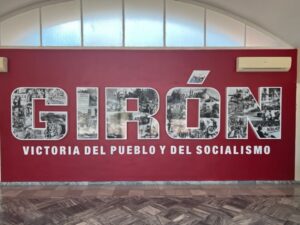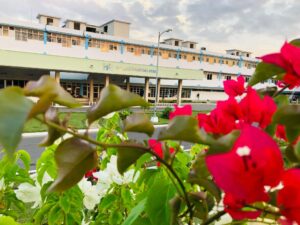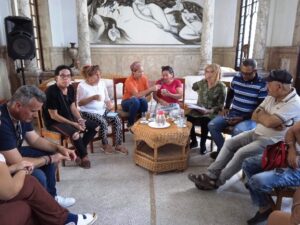«… the man who knows the most about high-power transformers in Cuba».
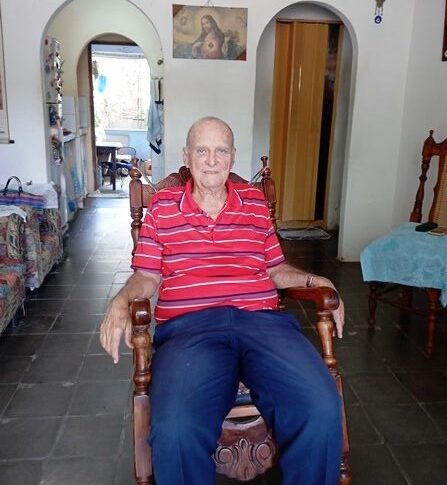
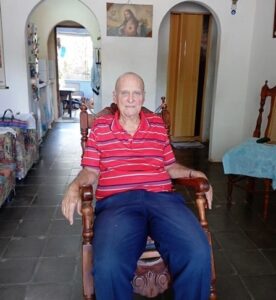
«Hey, that’s the man who knows the most about high-power transformers in Cuba, many know about isolated elements, but Luis knows everything, that old man knows a lot,» laughed a co-worker at the end of the interview.
And Luis certainly knows a lot, there is no doubt about that, but his greatest quality lies in the humility with which he expresses himself, for someone who has worked for almost 60 years dedicated to providing knowledge about high-power transformers. For Luis, training is indispensable due to the dizzying advance of technology.
He did not hesitate to step forward in the face of the complex situation in Caracas, where an attack left the city without electricity for eight days. He left for Caracas the day before he was decorated Hero of Labour of the Republic of Cuba. That is José Luis Silva Menéndez, who today at 78 years of age continues to work in the difficult profession of teaching.
How many years of work have you dedicated to this profession?
-I started working on September 16th, 1962 at the Empresa Eléctrica de Matanzas. We were the first group of the first graduation of middle-level electrical technicians of the Revolution. The graduation was presided over by Che, and a group of comrades were appointed to work in the electricity company, because at that time the company was capitalist and had been nationalised in the 1960s.
-It had been nationalised for almost two years and many of the existing personnel were not in favour of the Revolution and had left, and so there was a need to nourish the institution with new technicians to alleviate the situation. Unfortunately, the only one left from that group of those who joined the institution is me, the others have passed away and I’m still lucky to be alive.
-My work was always there until 2000, when the Transmission Company was created and I moved from the provincial entity to the ECIE (Electrical Industry Construction Company) until 2015, when I retired.
-I retired and I rested for only one month, because a month later they were looking for me and they hired me again. All my working life in the activity of sub-stations, primary equipment, transformers, switchgear…
You studied in Havana to get a better preparation in substations, but then you started working and studying engineering at the same time, which was a big challenge, wasn’t it?
I did a course in Havana on substations, I was also involved in underground cables and then I returned and went to work in the substation brigade and there I became brigade chief, I did my engineering degree as a worker, it was very hard because I was always on the move, outside, working in other places, in different provinces, here and there. It was a time of great investments in 110 and 220 kv and, well, I was able to finish my degree.
I imagine that in so many years of work you must have some anecdotes?
-No, I have several anecdotes. I remember a situation that happened here in Matanzas, in 1990. We had a breakdown in a transformer at the José Martí plant and I went to see it and I detected it, but it seems that at that time they didn’t trust me and they sent other colleagues from the National Directorate of the Union and when they got there, the colleagues said to me: «What did you do? And I told them, I did this, this and this, and they told me: we have nothing to do here, if the fault has already been identified there is nothing to do here, we are leaving. That’s one of the anecdotes.
-I remember the 70s, before the 70s harvest and after the harvest, the big electrification that was done here in Matanzas. Many substations were built for the collection centres. A provincial brigade was set up in the Colón area and we were based there. I was in charge of that work there. Substations were built at the Mexico power station; at Jesús Rabí, at Los Arabos, at Palmilla and the whole rural area of Colón was electrified for the collection centres. It was a very, very important job and I had the opportunity to participate in it.
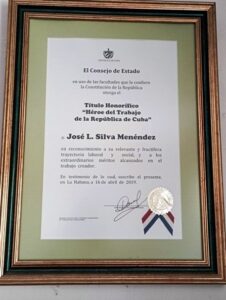
2019 was a transcendental year for your career, which marked a new experience, could you tell us about it?
-I was in Havana, I was there because they were going to give me the honorary title of Hero of Labour of the Republic of Cuba and one day before the decoration they called me that there was a problem in Venezuela, in the Gurí plant, an attack that had been made on a transformer and that it was necessary for me to go.
-I said that they were going to decorate me and they told me that it was urgent and that they had no one to send and that they were asking for me from Venezuela. Well, we left for there and we had a difficult, difficult task. We had to diagnose, draw up strategies and make changes to transformers, Caracas was switched off and stayed that way for 8 days.
-The mission was successful, they were very pleased, I made very good friends there and, well, I came back and I could not participate in the awarding of the title of Hero of Labour. But later, in 2020, it was awarded to me here in a solemn ceremony in the Parque de la Libertad.
How do you remember that moment?
-Imagine, very exciting, very exciting. Also, as it was something that was just me, because the others had already received it in 2019, so it was very moving, we were all there, my family, my children, grandchildren, wife and a lot of well-known people from Matanzas who attended.
-And now recently, in the month of November or December, there was a major breakdown in the transformer of Unit 4 of Carlos Manuel de Céspedes, and the director, Alfredo López, sent me, I participated in the report of the breakdown and then I coincided with the Venezuelan colleagues who had worked there with me. Apart from the fact that the work was a success, it was a joy to meet again with the colleagues who had worked in El Gurí, we have a very good relationship. From there, when they finished in Cienfuegos, they came here and we were doing diagnostics in Guiteras.
Teaching is also part of your professional life and has been a new stage in your life.
-I have already given two national courses. Two years ago we gave one on transformers and one on circuit breakers. Now I am giving another one on the practical application of transformer testing in Cano, which I give on Fridays, and I have also given several courses at the National Training School of the National Electrical Union.
For years I have been part of the teaching staff and with the CUJAE I have given two post-graduate courses, with professors from that institution, including one that they did for a degree in Maintenance and Diagnosis, I participated as a professor, I was a professor of a subject in that course as well.
What was the experience of giving classes like?
-I’ve always liked giving classes, I’ve always had that vocation and I’ve always liked the little I know to explain it well to my colleagues and for people to take advantage of it. I say that training is part of any worker and even more so if they are a high-level worker, if they are a technician, an engineer, they need to be trained. Everyone needs training.
-When I studied engineering, I tell the kids, there were no computers and we didn’t have a calculator, it was with a slide rule, you had to calculate logarithms and everything with a slide rule, it wasn’t easy. Not now, now the techniques have advanced, so if you don’t keep up with the technique, imagine….
-The kids who graduate from university and start working come with a different mentality. It’s not that it’s easier, but that it’s more feasible to study thanks to the media. There is the laptop, calculators, in our time it wasn’t like that. Everything was what the teacher said, the notes you took and then you could work, you know, with a rule of three, with a slide rule and that series of things.
-Now it’s more viable, but they need to improve because technology in the world is advancing a lot and it’s necessary to continue improving. I always do it and I’m always looking for information on the internet, I’m always searching, and that’s what I try to teach my classmates.
At the end Luis says to me with a smile on his face:
-Now this course that I am giving, I teach testing techniques that are totally modern, with totally modern instruments that are power electronics, and so I am very advanced in that sense and I teach it, I don’t keep knowledge from anyone, the little that I can teach, I teach it.
Written by Leydis Hernández Pelier.


